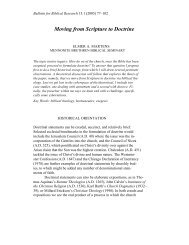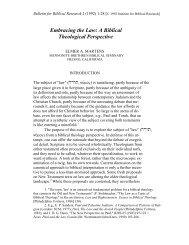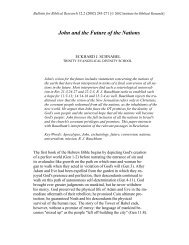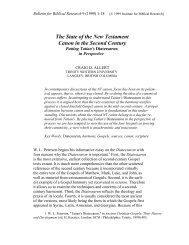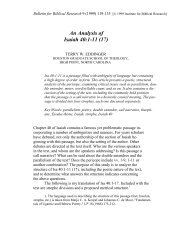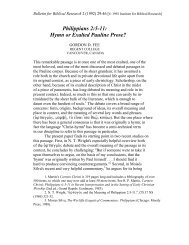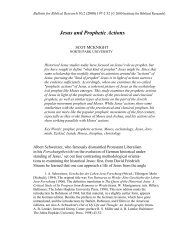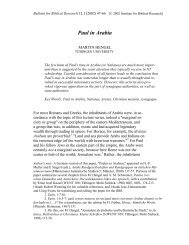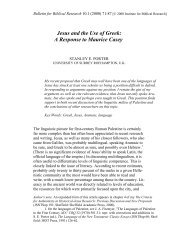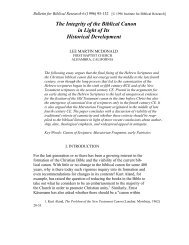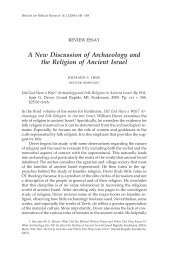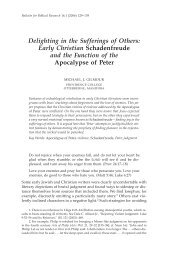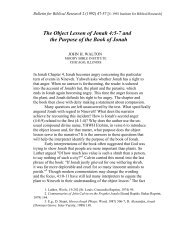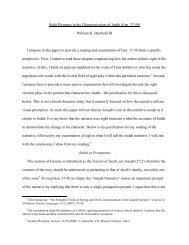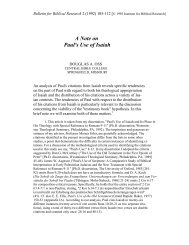Reflections on Exegesis and Spirituality in Philippians 4:10-20
Reflections on Exegesis and Spirituality in Philippians 4:10-20
Reflections on Exegesis and Spirituality in Philippians 4:10-20
Create successful ePaper yourself
Turn your PDF publications into a flip-book with our unique Google optimized e-Paper software.
FEE: To What End <strong>Exegesis</strong>? 81<br />
Thus God's aim <strong>in</strong> our lives is "Spiritual" <strong>in</strong> this sense: that we,<br />
redeemed by the death of Christ, might be empowered by his Spirit<br />
both "to will <strong>and</strong> to do for the sake of his own pleasure." True spirituality,<br />
therefore, is noth<strong>in</strong>g more or less than life by the Spirit.<br />
"Hav<strong>in</strong>g been brought to life by the Spirit," Paul tells the Galatians,<br />
"let us behave <strong>in</strong> ways that are <strong>in</strong> keep<strong>in</strong>g with the Spirit."<br />
Hence the aim of exegesis: to produce <strong>in</strong> our lives <strong>and</strong> the lives of<br />
others true <strong>Spirituality</strong>, <strong>in</strong> which God's people live <strong>in</strong> fellowship with<br />
the eternal <strong>and</strong> liv<strong>in</strong>g God <strong>and</strong> thus <strong>in</strong> keep<strong>in</strong>g with God's own purposes<br />
<strong>in</strong> the world. Thus it is simply wr<strong>on</strong>g-headed for us ever to<br />
th<strong>in</strong>k that we have d<strong>on</strong>e exegesis at all if we have not cared about<br />
the <strong>in</strong>tended <strong>Spirituality</strong> of the text—whether it be theological, doxological,<br />
relati<strong>on</strong>al, or behavioral.<br />
Now <strong>on</strong> to such an exegesis of Phil 4:<strong>10</strong>-<strong>20</strong>.<br />
III. PHILIPPIANS 4:<strong>10</strong>-<strong>20</strong> 7<br />
Let me beg<strong>in</strong> with the scholarly agenda, which <strong>in</strong> this case I f<strong>in</strong>d very<br />
often to be <strong>in</strong> the way of both underst<strong>and</strong><strong>in</strong>g <strong>and</strong> <strong>Spirituality</strong>. Scholarship<br />
has tended to have two difficulties with Phil 4:<strong>10</strong>-<strong>20</strong>, <strong>and</strong><br />
these difficulties by <strong>and</strong> large dom<strong>in</strong>ate the exegetical discussi<strong>on</strong> of<br />
this passage: (1) Its placement at the end of the letter. "It is <strong>in</strong>c<strong>on</strong>ceivable,"<br />
we are told, "that Paul should wait all that time to express his<br />
thanks for the gifts." 8 (2) The tw<strong>in</strong> realities (a) that Paul never actually<br />
thanks the <strong>Philippians</strong> for the gift (<strong>in</strong> the sense of us<strong>in</strong>g the verb<br />
eu)xaristei=n) <strong>and</strong> (b) that he uses an array of commercial language to<br />
express his acknowledgment.<br />
For those who are troubled by these th<strong>in</strong>gs, a variety of soluti<strong>on</strong>s<br />
have been offered. The most comm<strong>on</strong> soluti<strong>on</strong> to the questi<strong>on</strong> of placement<br />
is to divide the present letter <strong>in</strong>to three, mak<strong>in</strong>g our 4:<strong>10</strong>-<strong>20</strong> the<br />
earliest of the three, dashed off so<strong>on</strong> after Epaphroditus had arrived,<br />
<strong>and</strong> placed somewhat thoughtlessly at the end by a redactor. 9 The<br />
7. For more detailed argumentati<strong>on</strong> of many of these po<strong>in</strong>ts, see my commentary<br />
<strong>on</strong> <strong>Philippians</strong> (NICNT; Gr<strong>and</strong> Rapids: Eerdmans, 1995). In fact, some of the exegesis<br />
<strong>in</strong> the latter part of this secti<strong>on</strong> is lifted almost en toto out of the commentary, <strong>in</strong> part<br />
to illustrate the very po<strong>in</strong>ts be<strong>in</strong>g argued <strong>in</strong> this essay.<br />
8. F. W Beare, A Commentary <strong>on</strong> the Epistle to the <strong>Philippians</strong> (L<strong>on</strong>d<strong>on</strong>: Black, 1959)<br />
150.<br />
9. This has always struck me as an unusual "soluti<strong>on</strong>," s<strong>in</strong>ce it solves noth<strong>in</strong>g, <strong>and</strong><br />
<strong>on</strong>ly puts the problem back <strong>on</strong>e remove from Paul. As I suggest <strong>in</strong> the commentary, this<br />
seems more like a va<strong>in</strong> attempt to ex<strong>on</strong>erate Paul, s<strong>in</strong>ce we cannot really imag<strong>in</strong>e that<br />
Paul would have written differently from our "better selves." That is, s<strong>in</strong>ce we would<br />
have written it <strong>on</strong>e way, therefore Paul also must write that way. But somehow it is<br />
perfectly all right to attribute what we deem "improper" <strong>on</strong> the part of Paul to "m<strong>in</strong>dlessness"<br />
<strong>on</strong> the part of a redactor, who might rather have been the <strong>on</strong>e whom we<br />
should suspect of more thoughtfulness.



